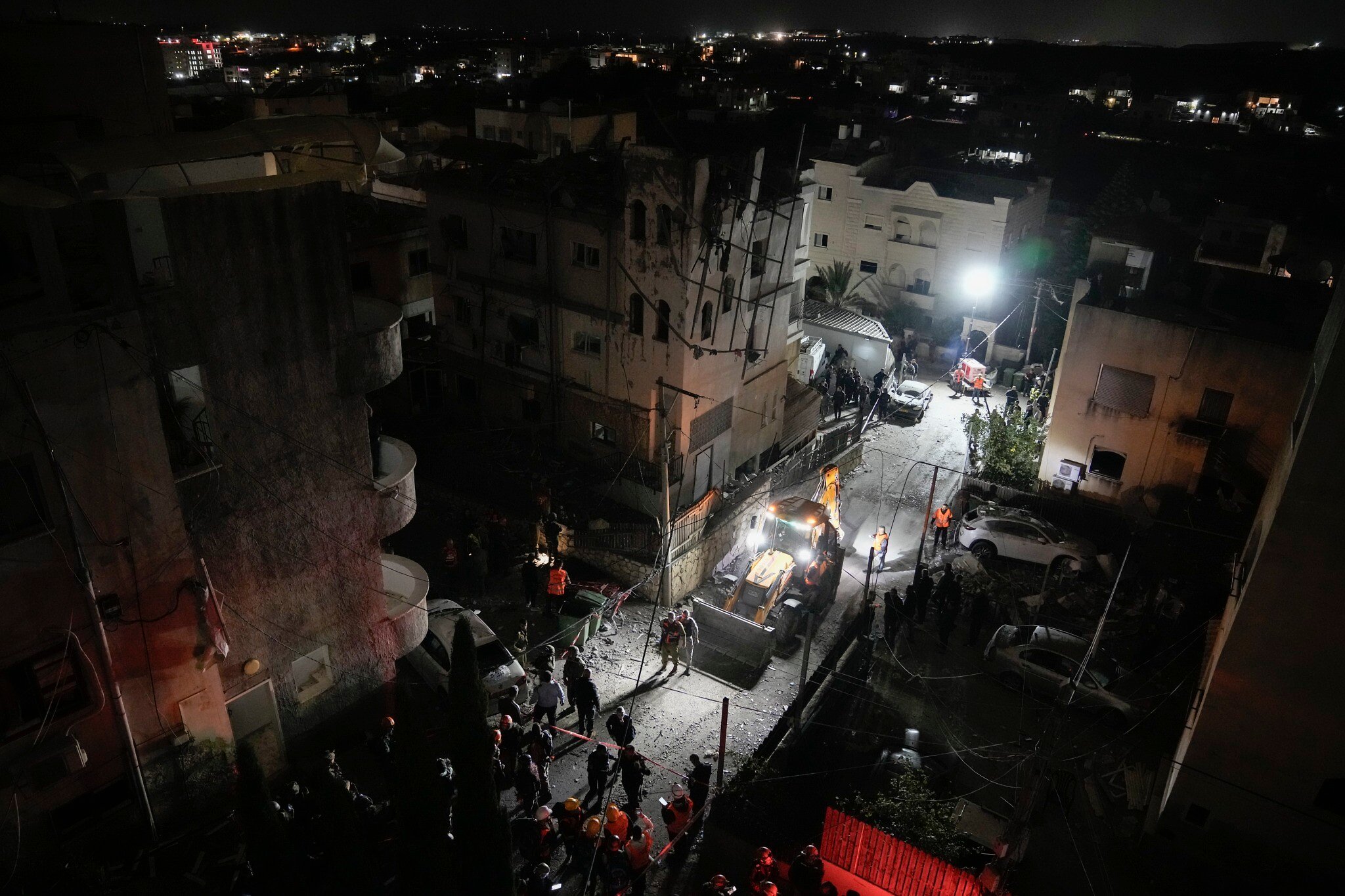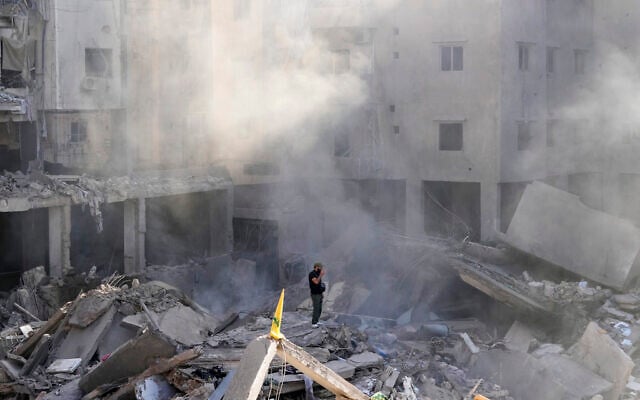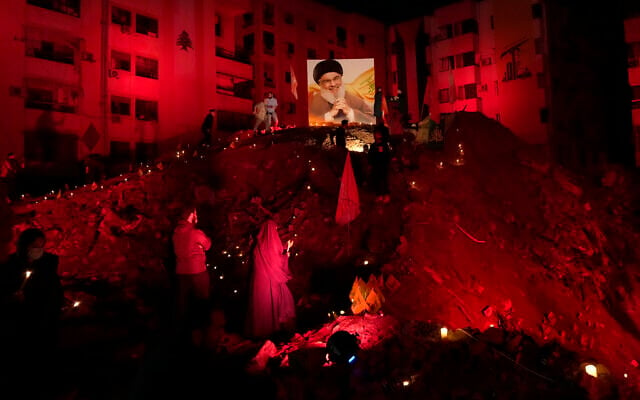



WASHINGTON — US intelligence assessments before Israel escalated its conflict against the Lebanese Hezbollah terror group in September was that such a move risked sparking an all-out war in which hundreds — if not thousands — of Israelis would be killed, three US officials and one Israeli official told The Times of Israel this week.
The assessments relied heavily on similar ones crafted by Israel’s own intelligence community, the US officials said, acknowledging that both countries’ assessments proved wildly inaccurate within days, as the IDF methodically took out much of Hezbollah’s missile and drone capabilities, dismantled its military infrastructure in southern Lebanon, picked off almost every member of its senior leadership and killed and wounded thousands of operatives — many of them in audacious mass-detonations of the terror group’s communication devices.
Hezbollah did manage to expand the range of its rocket and drone launches, disrupting life for tens of thousands of citizens in parts of Israel that had been immune to such threats over the past year. Fifty-seven soldiers and 21 civilians were killed during the roughly two-month escalation that ensued.
But Israel’s military achievements in Lebanon were overwhelming and ultimately led the Iran-backed Shiite group to agree to a ceasefire late last month after pledging for over a year that it would not halt the cross-border attacks that it began hours after Hamas’s October 7 onslaught until Israel agreed to a ceasefire in Gaza — one that remains elusive.
As tensions between Israel and Hezbollah began to ratchet up over the summer, US intelligence assessments warned of a very different scenario in the offing.
“The assessments… were that this was potentially going to be a catastrophic war that would cause potentially hundreds or thousands of Israeli casualties as Hezbollah missiles overwhelmed Israeli differences,” said one of the US officials.
The deadly scenario appeared increasingly likely as Israel began striking targets deeper into Lebanon while Hezbollah refused to unlink its conflict with Israel from the one in Gaza and negotiations for a hostage release and ceasefire deal in the Strip failed repeatedly to reach a breakthrough, said the three US officials.
Upon receiving the assessments from the American intelligence community, top aides to US President Joe Biden in the Pentagon and the White House began to hold meetings to formulate Washington’s response to such a deadly war, the first US official said.
The US officials stressed that intelligence assessments coming out of Washington weren’t very different from those being crafted in Jerusalem and even relied on the latter’s assessments.
“There’s a narrative out there that [Israel’s major offensive against Hezbollah] would have happened a lot earlier if the Americans hadn’t applied pressure on Israel and prevented it. That’s not what happened. Everybody was very concerned on both sides about what this would look like and how severe it would be,” said the first US official.
“This was why for many months Israel held off on launching the kind of attacks it began conducting in September. They were no less concerned about what a full-blown war with Hezbollah would mean,” said a second US official.
“Ultimately, they moved forward anyway, but it wasn’t under the assumption that it wouldn’t come at a major cost. The Israelis just believed that this cost was necessary,” the US official added.
On September 17 and 18, Israel simultaneously set off thousands of explosive-laden Hezbollah communication devices. Even then, the US privately continued to caution Israel to exercise caution, fearing the shock-and-awe operation would drag Iran into the conflict, the US official said, while confirming reports that Israel rushed to launch the exploding pager operation amid fears that its details had been exposed.
But Israel was unmoved by the words of caution from Washington, and the IDF conducted airstrikes two days later that eliminated the leadership of Hezbollah’s elite Radwan force. Then, on September 27, Israel killed Hezbollah’s longtime secretary-general, Hassan Nasrallah.
However, it was the widespread air raids that the IDF conducted several days earlier against Hezbollah’s rocket and weapon depots across Lebanon that “fundamentally” changed the US assessment regarding the trajectory of the war, the first US official said, adding that Washington went on to shift its position to back Israel piling on the blows against the badly battered terror group.
That doesn’t explain why the US still sought to broker a 21-day ceasefire between Israel and Hezbollah, announcing the initiative on September 25. But it does explain why the US quickly moved away from the temporary ceasefire effort as Israeli military gains against Hezbollah began to accumulate in the days and weeks that followed.
The White House said publicly at the time that it wouldn’t have moved forward with the effort if Prime Minister Benjamin Netanyahu hadn’t indicated his support.
The US was further emboldened in its position days later when it helped Israel thwart a second Iranian missile attack, further demonstrating that Tehran was almost powerless to come to the aid of its proxies.
Reflecting on how events developed over the past several months, a third US official noted that it was possible to defend the summertime intelligence assessments by chalking up Israel’s battlefield achievements to luck.
However, they weren’t very convinced by that argument and maintained that the ordeal should warrant a reckoning for the intelligence communities in the US and Israel.
During an onstage interview Tuesday evening at the 92nd Street Y, New York, US National Security Adviser Jake Sullivan was asked which of the events in the Middle East over the last several months were most surprising — from Israel’s restoration of its escalation dominance, to the apparent implosion of the Iran-led Axis of Resistance, to the overthrow of Bashar al-Assad’s regime in Syria.
“Yes,” Sullivan quipped in response, seemingly suggesting that all of those events caught the US off guard.
“Every one of those pieces has been maybe not surprising directionally — in the sense that, one could see the ways in which Israel, backed by the United States… was taking the fight to its enemies,” Sullivan began.
“One could see the weakening and the fracturing of the Axis of Resistance and the weakening of Iran, and one could see the pressure on Assad — particularly because his two main patrons, Iran and Russia, were distracted and weakened.
“But the speed, the scope and the scale of the remaking of the Middle East in this short amount of time — I think you’d find very few people who could have predicted all of that and that we would be sitting here in December of 2024 with the picture looking the way that it looks,” Sullivan said.




